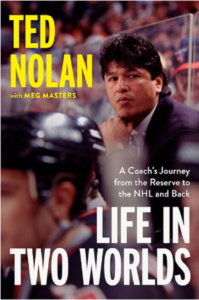Sam on Sports: Ted Nolan

By Sam Laskaris
GARDEN RIVER FIRST NATION – There were already plenty of reasons to admire Ted Nolan.
And now there’s one more.
Nolan, a Garden River First Nation member, has co-authored a book about his experiences titled, Life In Two Worlds, which came out in October. Toronto writer Meg Masters co-wrote the book with Nolan.
Hockey fans already knew plenty of tidbits about Nolan’s life. Like the fact he faced various challenges including racism while growing up, yet he persevered and became a professional hockey player.
Nolan had an eight-season pro career, which included 78 games in the National Hockey League (NHL). Sixty of those contests were with the Detroit Red Wings, the franchise that had selected him in the 1978 NHL Entry Draft.
And the other 18 matches were with the Pittsburgh Penguins, during the 1985-86 campaign, his final season of playing pro hockey.
After Nolan’s playing days were over, he became a coach. He won the Jack Adams Award for being the NHL’s top coach for his work with the Buffalo Sabres during the 1996-97 season. But after some infighting in the Sabres’ organization, Nolan did not return the following year, and it took him almost a decade before he resurfaced behind an NHL bench.
Nolan has publicly stated in the past that he felt racism played a role in why it took him that long to land another coaching gig in the world’s premier hockey league.
In the preface to his book, Nolan writes about the day a delivery man brought the Jack Adams Award to his house. He was miffed he was no longer still a part of the Sabres’ brass.
“Then I stood for a few seconds, staring at it, resting there between two sets of stairs – one leading up to my living room, one down to my basement,” Nolan wrote. “A rush of emotions came at me. Finally, they began to ebb, leaving just one: pure anger.
“I lifted my foot and, with all the strength I had, kicked the box, sending it hurtling down the basement stairs. I heard it land with a loud metallic crash. Then I turned and went upstairs, determined to forget everything about it.”
Nolan wasn’t required to tell readers about this private moment in his life. And yet he did.
And he continued to share other tales of his journey throughout Life In Two Worlds.
In the book’s conclusion, Nolan wrote that he was inspired to fully tell his story following the 2020 death of George Floyd, the Black man killed by American police.
“The shock that reverberated throughout the white population after the video of George Floyd’s murder made it clear how difficult it’s been for folks to see the racism that’s right in front of their eyes, to truly understand the things people of colour have been trying to tell them for years,” Nolan wrote. “And I realized that all of us who have experienced some form of it need to tell our stories, especially if we have some name recognition that will bring attention to them.”
Nolan’s book will not put a stop to racism, but it just might open some eyes and make him even more admired than he previously was.


